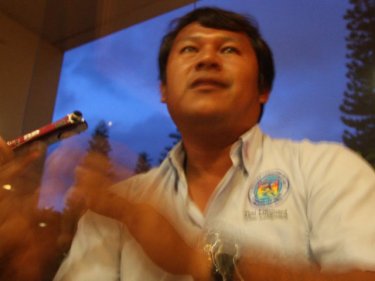''A more professional approach is definitely saving lives,'' he said.
''Beach management practices are 100 percent better than they were just a couple of years ago. It will take a little more work, but we are heading towards the Australian model of beach safety.''
Mr Field, who has been visiting Phuket for training and assessment since 2001, says the improvements are obvious to people who saw what passed for lifeguards on Phuket just a few years back.
Most beach-going expat residents on the island have noted a vast improvement since the days on Phuket beaches when, if a lifeguard could be found at all, he would be found asleep in a watch tower.
Yet one Phuket media outlet this week mentions Phuket's ''most notoriously dangerous beaches - Kata, Naiharn, Patong and Karon'' and questions the efficiency of the lifeguards.
Since 2007, Jayne MacDougall, Director of Risk Management and Loss Prevention at Le Meridien Phuket Beach Resort, has played a pivotal role in water safety training in several forms on Phuket.
''The Phuket lifeguards are getting better all the time,'' she said today. ''It's difficult to take people who have had minimal training and make sure they have the right equipment and a full understanding of safety culture.
''However, the recent improvements have been massive and people are making great efforts.''
Although lifeguards are essential at Phuket beaches all year, the monsoon season between April and October makes some tranquil stretches treacherous.
By far the most risky Phuket beach is Karon, where 12 of the 19 drownings since April last year have occurred.
''Karon is a longshore trough beach, the most dangerous kind of beach,'' said Mr Field, who has tested the danger by allowing himself to be sucked out to sea in a Karon ''rip'' current.
''I just took my feet off the sand and the water did the rest,'' he said. ''You will find yourself in deep water very quickly.''
The way to save your life if you do happen to be caught in a rip is to float out without fighting the pull of the current, then when the pull stops, swim to one side and chose a different route to shore.
Although he agrees the lifeguards on Phuket have improved dramatically, he acknowledges that Phuket's beach culture needs to change before Australian lifesaver standards can be reached.
''Vendors have taken to imitating the yellow and red safe-swim zone flags to attract customers,'' he said.
''We also have had parasailing operators remove the safe-swim flags at Patong beach when they happen to be in their way.''
At least one jet-ski operator at Patong ripped up one safe-swim flag and used it to stand on a jet-ski and wave in a jet-ski that was out on the sea, Phuketwan reporters have noted.
''As the training levels go higher, those who are not committed to the lifesaver ideal may fall by the wayside,'' Mr Field said. ''But the progress recently has been excellent.''
Earlier this week, most of the island's 106 lifeguards from all 13 west coast beaches gathered at a Phuket resort to review a series of rescue training sessions that included up-to-date resuscitation techniques.
The next major step will be to move in to teach water safety in Phuket schools.
There's already a regular ''nippers'' training program for children but only with a commitment for all Phuket children to learn to swim will a real transformation come.
Driving the process of getting there from here are Phuket Lifeguard Club leader, Prathayut ''Nat'' Cheryon, and his wife Khun Pik.
While Khun Nat is leading the battle on the beaches, it is Khun Pik, the group's communications manager, who sometimes finds herself in an intensive care unit at a Phuket hospital, consoling friends or family as life fades from a drowning victim.
Jet-skis are being rented as part of the service - but the hirer prefers them to be kept safely on trailers some distance from the water, except in an emergency.
Such are the cultural difficulties that have yet to be overcome.
Khun Nat says that what's most important is to persuade Phuket parents that their children are safer learning to swim - and eventually enjoying the fun in the water - than being banned entirely from swimming.
''The resorts on Phuket are learning that it is in their best interests to tell their guests to avoid the beaches on dangerous days,'' Khun Nat said.
''The parents of Phuket will eventually be persuaded, too.''
Khun Nat is under no illusion that there are times when Phuket's lifeguards fall short of the standards of Australia's lifesavers.
''It is not easy to stay alert at a beach, day in, day out,'' he said. ''That will come, though, as our lifeguards learn more and more about what's required.''
One of the lessons of this week's gathering was that safety extends beyond the beaches. The message: lifeguards who perform admirably on the sand shouldn't hop on a motorcycle and ride home afterwards without wearing a helmet.
With the levels of commitment now being shown by all local authorities and many resorts, the process of saving Phuket's reputation as a safe year-round beach holiday destination seems to be in sure hands.





Again, I said recently that the Thai Lifeguards are doing a bloody good job on Nai Harn and all take their job seriously. They are a credit and should be praised.
Posted by Graham on July 29, 2011 13:36